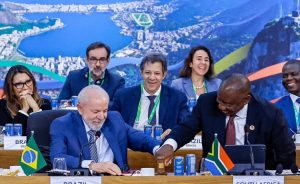Brazilian President Luiz Lula da Silva Hands Over G20 Countries Presidency To South Africa President.

South Africa has become the first African nation to assumed the presidency of the G20, the influential bloc of the world’s largest economies.
Brazilian President Luiz Lula da Silva handed over the reins of leadership to Cyril Ramaphosa, the South African president, on Tuesday during the G20 summit in Rio de Janeiro, Brazil.
President Cyril Ramaphosa pledged to prioritise Africa’s development and the Global South’s interests during his tenure.
“We will use this moment to bring the development priorities of the African continent and the Global South more firmly onto the agenda of the G20,” Ramaphosa said.
Ramaphosa highlighted three key areas of focus for South Africa’s presidency: promoting inclusive economic growth, addressing food security, and leveraging artificial intelligence and innovation for sustainable development.
He pledged to work towards greater global economic growth while ensuring no one is left behind.
South Africa is currently the only African member in the G20, a bloc that represents the world’s largest economies.
The G20 consists of 19 countries and the European Union, with permanent guest status granted to Spain.
Member nations include major economies such as the United States, China, Germany, and India
As the first African country to lead the G20, South Africa aims to champion issues of industrialization, employment, and reducing inequality, along with driving discussions on critical global issues.
“As South Africa, we undertake to advance the work of the G20 towards achieving greater global economic growth and sustainable development. We will work to ensure that no one is left behind,” Ramaphosa concluded.
Leaders of the world’s 20 major economies gathered once again on Tuesday with a lighter schedule after they issued a joint declaration the night before.
The document, which includes calls for a global pact to combat hunger, more aid for Gaza and the end of the war in Ukraine, was heavy on generalities and short on specifics.
The joint statement was endorsed by group members but fell short of complete unanimity. It also called for a future global tax on billionaires and for reforms allowing the eventual expansion of the U.N. Security Council beyond its five permanent members.

